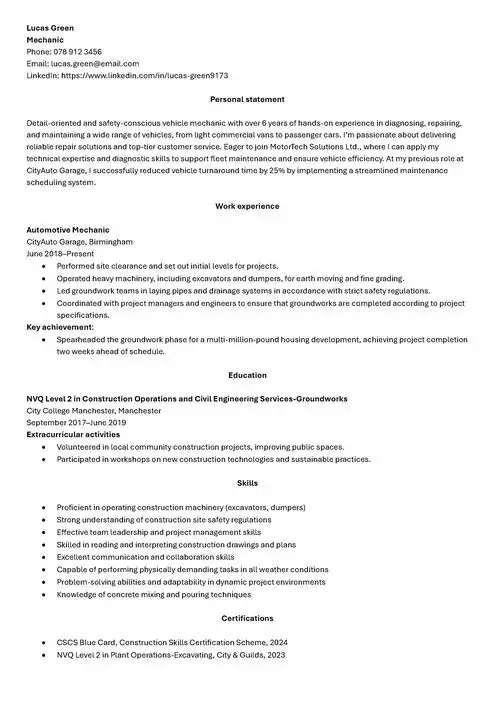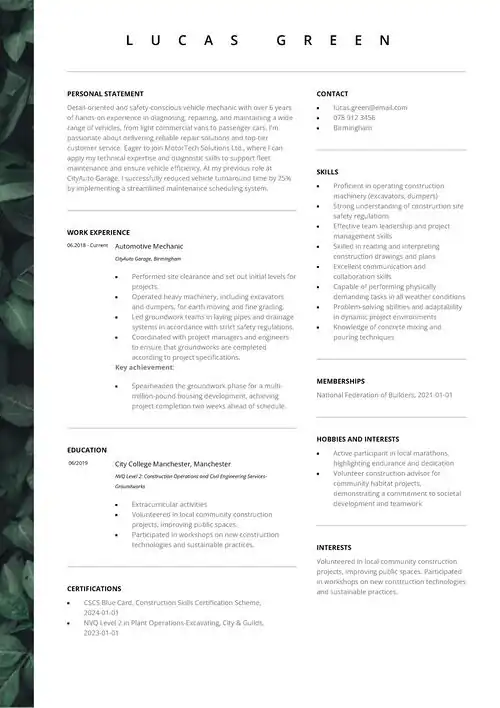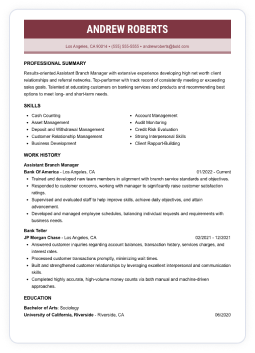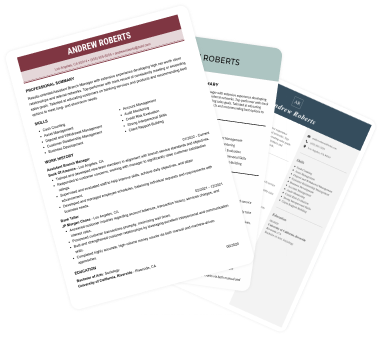Create a professional CV now!
 NO
NO YES
YESLast updated on 4 February, 2026

Our customers have been hired by*:
There’s a growing demand for skilled mechanics across industries, from automotive garages to manufacturing plants. But even with the shortage, you’ll still be competing with dozens of candidates for the best jobs.
In this guide, you’ll find the best mechanic CV example and practical tips on how to highlight your technical abilities, problem-solving mindset, and hands-on experience to impress recruiters.
Create an effective CV in minutes. Choose a professional CV template and fill in every section of your CV in a flash using ready-made content and expert tips.
Create a professional CV now!
 NO
NO YES
YESWe created the sample on the left using our builder. See other good CV examples like this one.
Lucas Green
Mechanic
Phone: 078 912 3456
Email: lucas.green@email.com
LinkedIn: https://www.linkedin.com/in/lucas-green9173
Personal statement
Detail-oriented and safety-conscious vehicle mechanic with over 6 years of hands-on experience in diagnosing, repairing, and maintaining a wide range of vehicles, from light commercial vans to passenger cars. I’m passionate about delivering reliable repair solutions and top-tier customer service. Eager to join MotorTech Solutions Ltd., where I can apply my technical expertise and diagnostic skills to support fleet maintenance and ensure vehicle efficiency. At my previous role at CityAuto Garage, I successfully reduced vehicle turnaround time by 25% by implementing a streamlined maintenance scheduling system.
Work experience
Automotive Mechanic
CityAuto Garage, Birmingham
June 2018–Present
Key qualifications & responsibilities:
Key achievement:
Education
NVQ Level 2 in Construction Operations and Civil Engineering Services—Groundworks
City College Manchester, Manchester
September 2017–June 2019
Extracurricular activities
Skills
Certifications
Memberships
Interests
Need a different CV example? See these guides:
Haven't found your job? Check our full list of professional CV examples.
Now you know what to include in your CV. Here’s a step-by-step guide to make a mechanic CVas good as the one above:
Your personal statement, or profile, is the first impression hiring managers will get of you as a mechanic, so it’s important to make it as good as possible. Keep it short but powerful: 3–4 sentences that grab attention and clearly outline who you are, the skills you bring, and what you aim to achieve in your next role.
A well-written CV summary showcases both your technical abilities and your passion for the trade. It’s the perfect chance to let hiring managers know that you're the right mechanic for the job.
The work experience section is the perfect place to showcase what you’ve done in your previous roles and show how your skills have brought value to the companies you've worked for. To make this section compelling, start by listing your jobs in reverse chronological order, with your most recent role at the top. This ensures hiring managers can immediately see your latest and most relevant experience.
When detailing your responsibilities, start each bullet point with a strong action verb. Words like repaired, diagnosed, maintained, calibrated, troubleshot, or trained create an active, dynamic tone that shows your initiative and expertise. Rather than simply listing tasks, focus on specific achievements and measurable improvements. Think about how your work positively impacted the company, customers, or team. For instance, you could mention how you:
A strong work experience section doesn't just list what you did; it highlights how you made a difference. This is where you can use the PAR (Problem Action Result) formula. Start by outlining a challenge you faced (e.g., equipment breakdown or delayed repairs), describe the action you took to resolve it (e.g., troubleshooting techniques, streamlining workflow), and finish with the positive results of your efforts (e.g., reduced downtime, increased customer satisfaction, or cost savings).
Your education section is important in highlighting your qualifications and technical training, especially for a role in the mechanical industry. Employers want to see not only your hands-on experience but also the foundational knowledge that supports your skills. Start by listing your relevant technical training, diplomas, and certifications. These credentials help demonstrate that you’ve received the proper education and are up-to-date with industry standards.
For each qualification, include the following details:
If you are newly qualified or still in the process of obtaining your qualifications, consider placing the education section above your work experience. This allows hiring managers to see that you have the necessary formal training before diving into your professional experience. For someone with more work experience, the education section typically comes after, but it remains equally important in showcasing your qualifications.
Including your education properly not only underscores your technical knowledge but also demonstrates your commitment to professional development, making you a more attractive candidate for any mechanic role.
Your skills section is where you bring together both the technical expertise and soft skills that make you an effective and reliable mechanic. Employers aren’t just looking for someone who knows their way around an engine—they want someone who can work efficiently, communicate well, and contribute to the team.
Start by listing your core technical skills, such as diagnostics, engine repair, brake systems, or working with specific tools or machinery. Then, balance those with soft skills that reflect how you work in a real-world setting: things like good communication, time management, teamwork, or safety awareness. Together, these show that you’re not only capable of doing the job, but of doing it well and responsibly.
You can take this a step further by adding a short sentence or phrase to each skill that explains how you apply it in practice. For example:
This section should reflect your real-world strengths and give hiring managers a quick, clear view of what you bring to the role, both in the workshop and as part of a team.
Beyond your core experience and qualifications, adding a few extra sections can help your CV stand out and show that you bring more to the table than just technical skills. Here are some valuable additions to consider:
These extras give employers a fuller picture of your skills, personality, and passion, helping your mechanic CV leave a lasting impression.
A strong mechanic CV is essential, but pairing it with a tailored cover letter can make your application stand out even more. Your cover letter is your opportunity to speak directly to the employer, showing enthusiasm for the specific role and company. Start with a confident introduction that shows genuine interest in the position—let them know why you want to join their team.
Then, highlight a key achievement from your career that reflects your skills and reliability as a mechanic. Whether it’s reducing repair times, improving workshop efficiency, or receiving excellent customer feedback, this is your chance to showcase your impact. Follow this by explaining how your skills and experience directly align with the company’s needs—mention any relevant tools, vehicle types, or certifications that match the job description.
Finally, close your letter with a polite but proactive call to action, such as: “I’d welcome the opportunity to discuss how I can contribute to your garage.” A thoughtful, targeted cover letter shows professionalism, personality, and a real interest in the role, all of which help you stand out to hiring managers.
Before you send off your application, make sure your mechanic CV is polished, professional, and easy to read. A well-formatted CV helps ensure your skills and experience don’t get overlooked.
With these details in place, your CV will look as professional as the experience it represents—helping you land interviews for the best mechanic jobs out there.
You don’t have to be a CV writing expert. In the LiveCareer CV builder you’ll find ready-made content for every industry and position, which you can then add with a single click.

Thanks for reading! Good luck with writing a mechanic CV and all the best to you on your career journey!
Our editorial team has reviewed this article for compliance with LiveCareer’s editorial guidelines. It’s to ensure that our expert advice and recommendations are consistent across all our career guides and align with current CV and cover letter writing standards and trends. We’re trusted by over 10 million job seekers, supporting them on their way to finding their dream job. Each article is preceded by research and scrutiny to ensure our content responds to current market trends and demand.
Category: CV Examples
Crafting a job-winning CV is all about showcasing your unique skills and experiences. Start with a strong personal statement that highlights your career goals and achievements.
Try Our CV Builder Now